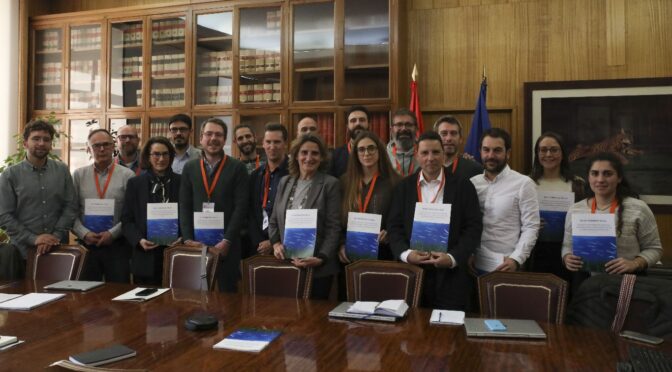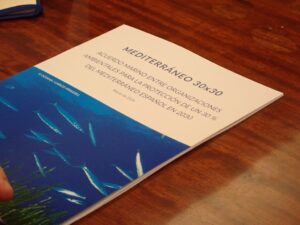Views: 646
Fifteen environmental organisations are asking the Government to strengthen the protection commitments of the Spanish Mediterranean Sea. The organisations call for decisive actions and request participatory governance for the presentation of detailed explanations, implementation and evaluation of the plans for managing the area.
TARGET: 30% protected, 10% without extractive activities
Continue with the commitment and redouble the efforts to achieve effective protection of 30% of the Spanish Mediterranean by 2030 and by 10% reduction of the figures that allow for extractive activities such as fishing, mining, or sand extraction. This is what fifteen environmental organisations demand in the document they submitted to the Ministry for Ecological Transition and the Demographic Challenge. The third vice president and minister for the Ministry, Teresa Ribera, attended the meeting with the Director General of Biodiversity, Maria Jesús Rodrígues de Sancho and Fernando Magdaleno, deputy Director General of Terrestrial and Marine Biodiversity.
Representatives of the environmental entities ANSE, ClientEarth, Ecologists in Action, the Marilles Foundation, GEN-GOB Eivissa, GOB Mallorca, GOB Menorca, Greenpeace, OceanCare, Oceana, Save the Med, SEO/BirdLife, Tursiops, Viejo Marino and the WWF, met together with MITERD to recognise the achievements so far, with 21% of protected marine surface designated to Spain, and to insist on the importance of Spain fulfilling its international commitments to protect the marine environment.
At the meeting, the importance of protected marine areas for the conservation of the Mediterranean Sea was stressed: “It is urgent that Spain complies with the international agreements for the protection of the marine environment. These agreements establish the need to reach 30% of the seas placed under protection and efficient management, as well as guaranteeing 10% pf the sea remains under strict protection, free of anthropic activities that can compromise its environmental health”.
Protect, restore and recover
In addition, the importance was underlined of the Ministry developing ambitious and participatory management plans and allocating “the necessary resources to implement them so that the protection is real and effective”.
The proposal, agreed by the environmental organisations, includes actions to guarantee an adequate management of the protected marine areas (EMP). The document stresses the importance of drawing up and implementing effective management plans and underlines the necessity of designating new protected areas and assigning the necessary resources to identify new additional biodiversity enclaves beyond the 30% already protected.
The document also details actions for restoring ecosystems and recovering vulnerable species. Therefore, among the proposed objectives are the development, the publication and implementation of the recovery plans of vulnerable or species in danger of extinction like the angel shark (Squatina sp), the fan mussel (Pinna nobilis), the Balearic Shearwater (Puffinus mauretanicus) and the loggerhead sea turtle (Caretta caretta). It should be noted that some of these plans are being processed, which demonstrates the active commitment of all the interested parties in the conservation of the marine biodiversity.
Effective surveillance and participatory governance
The organizations stress that protection will be effective only if it has the necessary resources to guarantee adequate management of these spaces, as well as adequate monitoring and effective surveillance. It must not be forgotten to explain the values of the protected marine areas to the general population to raise their awareness and involvement in the protection, so that by 2030 all those areas designated until 2025 have approved or revised management plans with ambitious objectives and concrete measures.
Among other measures, the agreement proposes activities to reduce the impact of by catch on fishing tackle, trawling or “ghost fishing” (eg from abandoned or lost fishing gear); adopt measures to reduce the submarine noise produced by sea traffic and other civil and military activities; take effective measures to avoid the deaths of whales and other marine wildlife species due to the collisions with boats and improve the quality of the coastal waters, pursuing zero discharges and improving the management of sanitation systems.
Finally, the proposal insists on a commitment to participatory governance for the designation, elaboration, implementation of the management plans of the protected marine areas as a methodological basis in order to achieve the objectives of protection and conservation.
A great biodiversity threatened
The current double crisis – climate and loss of biodiversity – poses a serious threat to the Mediterranean Sea. With more than 17,000 marine species (18% of all known species in the world) the Mediterranean is one of the areas of the most biodiversity on the planet: but, it is also one of the most threatened. The average temperatures of the entire basin are already 1.5° higher than preindustrial levels and the decline of its ecosystems, like the sea grass meadows, is already a reality.
The Mediterranean also suffers from large impacts caused by tourist overcrowding, intense maritime traffic and coastal urban growth and is the most overexploited in the world. Furthermore, around 150 million people live and depend on this sea.
The document presented is based on the conviction that the proposed environmental policies will be fundamental to laying the foundations for a future in which the Mediterranean prospers and can continue to be a source of life, wellbeing and culture for our society.


